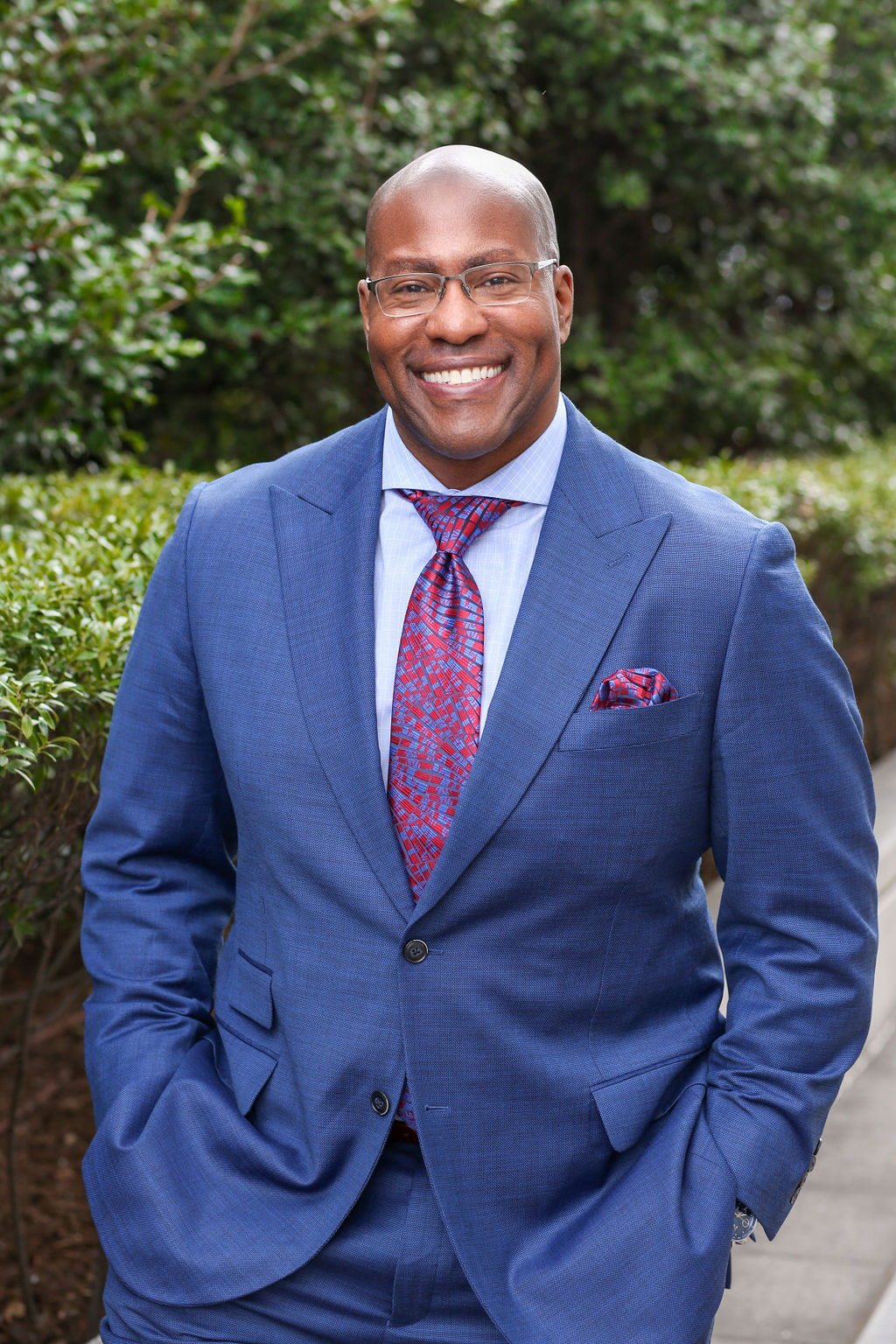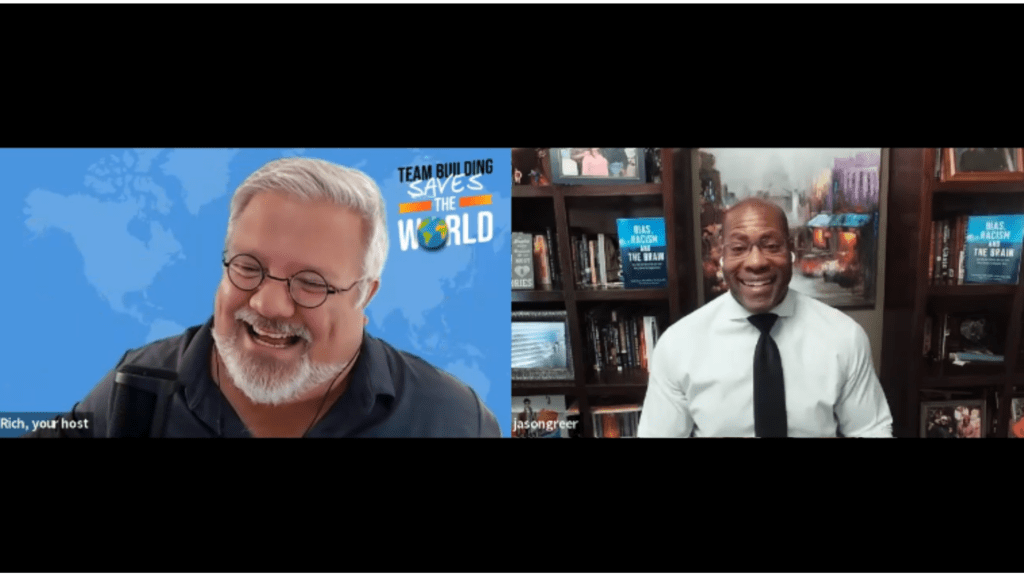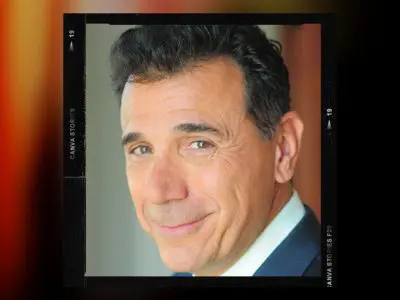Combating Quiet Quitting
w/Jason Greer
Use the buttons above to listen now.
Transcript - Combating Quiet Quitting
Rich: On this episode of team building saves the world.
Jason: Okay. Since I’m the employee whisper, I’m gonna give you the politically correct answer, no, they’re not worried about it. Everything’s fine. Now let me give you the real answer.
Rich: Sure. Yeah, please.
Jason: I have never seen a permanent record. I’m still looking for it.
I’m still looking for it.
Rich: You’re gonna make me so mad at my mom.
Jason: But people don’t recognize that we have the ultimate superpower, which is our ability to listen.
They’re coming to work because they feel like I’m part of something bigger than myself.
Rich: Hello team. It’s me, your old friend Rich Rininsland host of team building saves the world. The show where I speak to the leaders and innovators in employee wellness and corporate culture on how it reflects in the world of today. And today we are discussing quiet quitting with internationally recognized employee labor consultant and author of the best selling books,
people matter most and bias racism and the brain Jason Greer. But first I need to share some love with my supporters at team bonding. If your team is ready to experience team work through the power of play, then visit team bonding.com to learn more. Now team join me in welcoming the employee whisper himself.
Mr. Jason Greer.
Hello, Jason.
Hey thank you so much for coming on board. I hope you don’t mind, but I hired a thousand people just to hide under my desk and applaud you.
Jason: Hey, I love it. They need to walk me to the airport. That made me feel really good. So thank you, man. I appreciate you. That’s awesome.
Rich: So Jason, let’s start off, right?
Just real quick out there for all of my team. Can you just tell them a little bit about yourself and how it was that you got in this line? .
Jason: Yeah, no worries. So I’m the founder, president of Greer consulting, Inc, which is a labor and employee relations consulting firm got started in 2005. I’m a former federal agent with the national labor relations board, and really did it on a wink and a prayer.
When I say a wink and a prayer that’s legitimately all I had at barely had a hundred dollars in my bank account. And I was just really hoping that I could get maybe one or two clients per year, just to be able to pay my mortgage, be able to pay my card note and, you know, fast forward some, what has it been 17, 18 years.
And now I’m in the top 5% of employee labor relations consultants in the country. So it’s just been a fantastic ride.
Rich: So we’re talking about this brand new trend that is really lighting up TikTok and Twitter. Um, yes. I just saw on a, I saw an article today that said it’s almost reaching 4 million view.
Just for the hashtag quiet, quitting, start off. Define that. What actually is quiet quitting?
Jason: Well, I’ll tell you what quiet quitting is is essentially you have not quit. You’re still on the company’s payroll and you are barely doing. When I say barely, let me, let me correct. That what you’re doing is whatever your job description says, that’s exactly what people are doing.
And they’re not deviating from that. So there’s no additional work that’s being piled on them. There’s no going beyond the proverbial 40 hour work week. They are essentially working to pay the bills. But for so many people, what this really comes down to is the fact that people are tired. People are stressed and they’re looking at what they’re getting paid.
Plus the fact that they’re doing two or three other people’s jobs in addition to doing their job. And what people are essentially saying is I’m going to quiet quit, which simply means that I’m gonna show up. My boss is gonna still see me. The company’s still gonna recognize that I’m an employee. I’m still gonna do my job.
I’m just not going above and beyond. Like I used to.
Rich: So two or three people’s jobs. Why are they being loaded down with so much? Is this a result of the great resignation or is it something more.
Jason: Think it’s the result of COVID. Okay. So I would think of these things from a time. You know, well, really a timeline.
So you consider COVID was the ultimate reset. I mean, look, companies can forecast your listers can forecast out all they want for what the upcoming year is gonna look like. But no one really saw COVID coming and COVID hits. All of a sudden people are off work or they’re working from home, which for many people, many industries was something new.
And they’re taking a look at their lives and they’re really starting to take stock of really what’s important, especially as they started seeing loved ones who are getting sick, loved ones who are passing away. Right. And they started asking themselves the ultimate question, is this what I want my life to be?
Do I wanna continue to work in, you know, 80 to 90 hours a week? Basically the best years of my life are being spent working for a corporation. Mm-hmm, giving everything I have to, to a corporate body. and I’m hoping that by age 65, I’m gonna have enough money in the bank so I can actually live my life the way I want to.
So I think that happened. And then we had the great resignation where people were self-selecting on the job market. But then under the great resignation came this idea of quiet quitting, because look, I don’t know about you. Sometimes I look at folks who have been on the job market for two years. They don’t have a side hustle.
They don’t have side gigs that are going on. Yeah. And I wonder, how are you paying the bills? Right? On the other side of that, I think you have people who are like, look, I need to continue paying the bills. I actually like my job. So that’s a misnomer here. When people talk about quiet quitting, they’re not saying that they don’t like their jobs.
Mm. In fact, many people are still very passionate about their jobs as the employee whisper, and I did not give myself that name. My clients gave my, gave me that name was employee whisperer. I talked to thousands of managers, talked to thousands of employees over the course of the year. And what they will tell me is I still love what I do.
I’m just tired of the fact that because people have quit, people have been on extended layoffs instead of the corporations going out and hiring more people because it’s really hard to find available talent these days. Instead of the corporation going out and hiring new people, what they’re doing is if they have four open positions and I’m that one position that actually has a body in it.
Yeah. They just give me those four additional people’s, uh, uh job assignments. And as a result, they’re not paying me more. They’re not adding an additional 24 hours over the course of a day, and I’m barely able to keep my head above water.
Rich: Okay. So this isn’t a new phenomenon, is it? I mean, I’ll be honest with you, um, being a performer, being a, an actor and a writer and, and you know, director and so on and so forth.
I have been, throughout my entire career, living off the, the corporate world as a, I need something that supports my life choices. I need something that supports the career. Sure. I’m in. But even I have gone through days, weeks, maybe month where I just can’t handle the load I’ve been given. So I’m going to settle back in just a little bit, because for me,
that whatever job I was in at the time was just that it was a job. It was something to get me by. I didn’t need, right. I wasn’t looking for advancement. So why is this suddenly becoming trendy? Uh, why is it suddenly lighting up the internet?
Jason: Because it’s the beautiful power of social media. like, let’s be, let’s be real.
Somebody, somebody does a TikTok video. And they talk about, I am quiet, quitting, and then all of a sudden it blows up in the world is like, oh, I can’t believe this is happening. Look, you know, I said this earlier and I thought I was gonna say it, but I’m gonna go say it anyway. I work for the federal government.
If you want to talk about the epitome of quiet quitting, go to the government, they, you know, there’s so many employees who are doing wonderful work, please don’t get me wrong. Right. They’re passionate. They’re excited. They love it, but they’re in it for the long haul. And if you have somebody who’s like, I’ve been here for 30 plus years.
This has gotten very routine for me. I know what to do, and I can do this with my eyes closed. Mm-hmm , I’m going to put in the bare minimum so I can get by because that’s all my job really requires. So quiet quitting has been around for ever. Just so happens that social media’s caught up to this trend. What I will say though, is
one of the mistakes that people are making as they talk about this whole quiet quitting trend is the fact they believe that this is only a millennial and a gen zer thing. No, this is a gen X thing too. I’m 48 years old. So I’m dating myself here. Yeah. Quiet quitting has been around for the entirety of our existence as professionals.
Right? It’s just, we don’t make videos about it. We don’t tell people about it because at age 48, I will tell you, I still have this fear of something going on my permanent record. If you don’t know what that permanent record is when we were kids, if you got in trouble, the first thing your teacher would say, the first thing your parents would say is it’s gonna go on your permanent record.
Yeah. Now I will tell you I have traveled the world. I have been in meetings with some of the most powerful Kings and Queens of industry. And I will tell you this brother, I have never seen a permanent record. I’m still looking for it. I’m still looking for it.
Rich: You’re gonna make me so mad at my mom.
Jason: well, thank you.
Thank you. So it sounds like we came up kind of similar.
what I will tell you though, is we just don’t make videos about it. Right. But it reach back to, I don’t care if you’re a gen Z. I don’t care if you’re millennial. I don’t care if you’re a gen X. I don’t care if you’re a baby boy, mm-hmm, something has happened in America.
Or maybe we’re just starting to be honest about what’s been happening in America from time Memorial is that we are more stressed than we’ve ever. we have more than we’ve ever had. We have access to more than we’ve ever had, but we are so stressed. And I think it’s not just in terms of what people are doing in their jobs, but it’s, what’s going on in people’s personal lives.
It’s sort of society as a whole. And I think people are getting to a point where they’re starting to ask a bigger question of what do I want for my life. And that’s where this quiet, quitting thing is coming in in terms of people really talking about it.
Rich: I wanna come back to that, but I, I have to ask, as you are the insider for all of this, what is the boardroom sounding like when it comes to this?
Are they worried or are they recognizing that this is something we’ve always had to contend with? Or are they afraid that they’re going to see a bunch of people going, oh, I can do that because they’re seeing it on TikTok and thinking, now they can get away with it.
Jason: Okay. Since I’m the employee whisper, I’m gonna give you the political correct answer.
No, they’re not worried about it. Everything’s fine. Now let me give you the real answer. They, they, they are, they are scared to death about it because there’s this whether we like it or not. When we talk about corporate America, when we talk about not for profit America, right? There’s this idea of, if I’m going to pay you to do a job, I expect that you’re going to do a job and then some, okay.
Which means that you have your job duties, but then there’s that little bullet point that says as you know, other duties as a sign. Yeah. Yeah. And we, we want you to not only do what’s in your job title, but we also want you to do what we throw at you. So now this idea that employees and managers and leaders are going to start thinking less about the, you know, social media memes that go out there, you need to push hard, you need to be aggressive, winners win.
And now people are going to start thinking in terms of maybe I don’t have to be as aggressive toward this career, especially if I’m not looking at moving up. It scares, it scares people. It scares leaders because there’s this idea of what is happening to our culture in terms of our work culture. But also what do we do because we know how to pay people.
We know how to get clients. We know how to get business. We know how to get our products, goods, and services out, but we don’t know how to deal with this ever shifting attitude toward workplace culture. So I’ll say in a nutshell that I think corporations based on what I’ve seen based on what I’ve been told, they’re concerned about it.
The good thing about it. Cause there’s always a silver lining in everything. Right? The good thing is I’m starting to see more of my clients as well as corporations that we deal with who are actually asking the bigger question of what can we do to really engage people? What can we do to make sure that we’re putting systems in place where people feel heard, they feel respected, they feel recognized.
That’s a shift that we weren’t necessarily hearing pre COVID. We heard people talking about it. They were talking about it theoretically, but now what I see and it, I really love this idea is the fact that it’s actually starting to bear fruit, that people are getting along the idea of we employ human beings.
So how can we treat them as human beings? Hm.
Rich: So how what’s the answer? I mean, the, it sounds like it, it sounds like there’s a lot of possibilities out there, but what do people seem to be going for now? What’s a, what’s it, what’s a fast, easy solution to at least try to get people back on board.
Jason: I’m gonna tell you this right now, the fast, easy solution. And I’ve been preaching this for the entirety of my career is listening to people. Look, we live in this world of Marvel movies, you know, DC comic movies and all that great stuff. And kids love superpower individuals, adults love superpowers, but people don’t recognize that we have the ultimate superpower, which is our ability to listen.
So now what I love and what I love about my work is that we’re actually focusing leaders on the idea of taking a step back and not talking in terms of products, not talking in terms of production, but now talking in terms of how do I go about best listening to my employees. So what this means for a leader is if you have five meetings set over the course of a day, and you’re going to talk about all things work related, what I share with leaders is set aside 15 minutes, and I know that you’re busy.
I get that right. But set aside 15 minutes where you send an outlook calendar invite or whatever it. That you use for your organization to your employee. And you say, look, I just want 15 minutes of your time. I don’t wanna talk about work. I don’t want, unless you wanna bring it up. I don’t want to talk about, you know, the company’s latest logos.
I want to focus on you. What do you need from me? How can I help you? How can I be there? Because I need to let you know that I’m here to support you. But I live by this idea, sir, that people will work for money, but they will die for respect and they will die for recognition. But how you wanna be respected might be different than how I wanna be respected.
How you wanna be recognized might be different than how I wanna be recognized. The beautiful thing is we have leaders. We have organizations that are actually starting to embrace this attitude.
Rich: Fantastic. I wanna step away just for a real quick second, Jason, I hope you don’t mind. Cause I do need to tell all my team out there about a company.
I am very proud and happy to be working with that’s team bonding. Team bonding was founded over 20 years ago with one simple question. How can employees have a great time while fostering strong, authentic bonds between people who work together? They’ve created a catalog of innovative events using the power of play as a learning tool and tapping into the correlation of work and.
From scavenger hunt to jeopardy and so much more the team bonding of activities be the live virtual or hybrid maximizes the impact of team building with an accent on fun. So visit team bonding.com to schedule your next event. Now team bonding when you want seriously fun results. And we are back with Jason Greer.
We are talking about the quiet quitting culture that seems to be taking over the internet. Hopefully not taking over business. Let’s back up just a little bit here. Jason, who is it we are primarily seeing, this is this, like you were talking about your gen X and you’ve known, you’ve known about this for a long time.
It’s just, now there’s a name to it, but is, is the corporate world worried that this is a strong millennial gen Z leaning?
Jason: Yeah. You know, great question. I think based on conversations that I, and I can only speak based on conversations I’ve had with my clients, the, the initial focus was on millennials and gen Zers, but what they’re now seeing, and I’m really proud of the fact that I’ve been able to really steer people toward this is.
We’re starting to focus as well on gen Xers, because it’s one thing. Look, if you wanna know what your employees are thinking, if your employees are the age 35 years and younger, if you wanna know what they’re thinking about, go on social media. They’re gonna tell ’em. Sure. Right. But for folks who are 36 and up.
We’re not necessarily going to talk to you about it because we’ve sort of been bred with this attitude of you show up, you do your job, and if you’re gonna complain, you complain at home, you don’t complain in the workplace. Right. Right. Right. So I think that the initial focus when this quiet, quitting phenomenon started to take place or take root, the initial focus was on the younger workers.
But now the focus has become across the board because it’s an overall idea of what are we doing wrong and what can we do to make it right?
Rich: Hmm. So. Let’s say that I’m a manager and I’m afraid that this is starting to come up with the people under me. What can I look for early days instead of watching their productivity numbers start to slip?
What can I actually look for in an employee that will tell me that they’re going in that direction?
Jason: yeah. What I will say to you. It’s a wonderful question. What I’ll say to you before you start to look at your employees, look at yourself first. Nice. Okay. Because what happens for a lot of folks? It’s not like people wake up this morning and they’re like, man, I don’t think I’m just gonna quiet quit today.
it’s something, something, right, right. It’s something that happens gradually. And if you’re not, if you’re not looking for it, you might be part of this quiet quitting train. You have no idea that you quietly quit a long time ago. So what I tell leaders. Take an assessment of where you are, take an assessment of how you feel internally towards your job.
Take an assessment of what’s going on externally within any, you know, within your personal world, within your professional life. Mm-hmm and also start to look at, do you feel like your productivity is slipped because you will know your productivity slipped on before anyone else does, right. If you’re being honest with yourself.
Yep. After you take an assessment of yourself as a leader, then you start to look at your employees. Like, let’s say for example, you have an employee who started six months ago, and you remember that employee during orientation was on fire. She was so excited. She was pumped. She was so proud to be working for the company.
She was so excited during the interview and all the things that she’s gonna bring to the table and then take a look at the, her tone and emails. Has it gone from this very personal tone to more of a, just straight to the business. Also take a look at timestamps. You have employees who might be sending you emails at one o’clock in the morning because they were up doing work.
Right. And then four weeks later, you take a look at the timestamp and that you don’t get any emails beyond 4:59 PM. Right? Okay. Or you also, are they engaging? That’s another tell to sign whether or not someone’s quiet, quitting. Are they engaging? Are they when you send an email, when you call them, when you’re having a zoom call, do they seem like they’re enthused about the work?
Do they seem like they’re passionate about the work, but more importantly, do they seem like they’re present? That’s really where it comes into really reading body language, because even though people are working remote, for the most part, if you have your employees who turn on the cameras, you can kind of tell who’s involved.
And who’s not.
Rich: What about the employees themselves? If you’re talking about, if there’s an X number of people in the workforce for whom this is a strategy that they’re gonna start doing for themselves, but they’re already being asked to take on the work of two to three other people. Doesn’t that mean that their fellow employees have to now bear their load.
Jason: A hundred percent, two weeks ago, actually, I actually broke up a fight when I say I broke up a fight. I’m not talking like Mike Tyson versus Amanda. Holy sure. Fight. Yeah. Right. Yeah, no, no ear biting or anything like that, but more of this sort of passive aggressive fight that had been building over time got, because you had one employee who was about the business about doing her job.
She shows up every day. She’s just fantastic. I mean, and let me just say this as sidebar, fantastic. To the point of she will be running a company within the next 20 years. That’s how good she is. Excellent. On the other side, she had this employee and she had a fellow employee who was a good guy, good in his production, but all of a sudden decided that he no longer wanted to really show up to do the work, he quietly quit.
Yeah. So what happened was because she was such a go getter and her manager knew she was a go-getter and her manager knew that the production for this employee, this other employee was slipping. What the manager did was she just took his work and gave it to the future start of the organization. Mm. She was getting bogged down and on one hand she felt like, okay, this is great because my manager believes in me.
Yeah. On the other hand it was looking, not at her manager, but looking at her fellow employee, like, dude enough, if you don’t like working here, then quit. But I hate the fact that you still continue to show up every single day, get a check, but I’m doing all your work. Yeah. Yeah, because that’s the other side of this quiet, quitting phenomenon.
It’s not just in terms of what the C-suites thinking. It’s also in terms of what fellow employees are thinking about fellow employees and, you know, and I know, you know, who works hard and who doesn’t right. But the problem was, you know, in the past it was, we had enough people within the department that we had one or two people who weren’t pulling their weight.
We had at least five or six other people who could pitch in right. So we effectively, you know, wherever they were weak in, we were strong in. But now that you have so many organizations and so many departments within those organizations that are at the bare minimum on staffing right now of a sudden, I not only have to pick up the slack of four to five.
Open slots that we don’t have filled. Mm-hmm I also have to pick up your slack. Mm-hmm that’s too much for me to deal with and we’re seeing so much animosity that’s going on within the workplace.
Rich: So this is definitely something that these quiet quitters kind of need to take into account
Jason: if they care.
Right. Here’s another thing, right? It’s I think you’re right. They need to theoretically take that into account. But if you sit down with some of these quiet quitters, like I’ve sat down with some of these quiet quitters, they will tell you, you want me to care about how my lack of productivity or better yet forget that you want me to care about the fact that I don’t do 50 or 60 hours a week.
I do my required 40 hours a week, right? The impact that that has on my fellow employees while I’m also dealing with the fact that my mother and father have COVID and on our may pass away, I have kids who one week their working from home the next week they’re at school. Yep. We have society going crazy. We have politicians going crazy.
We have racism going crazy. We have sexism, all these things. In addition to the fact that I’m barely able to maintain all insanity and you want me to care? The reason why I’m bringing all these things up is the world of work used to be compartmentalized. But today, the world of life is not compartmentalized because we are on 24 7.
Yeah. If you wanna know you’re on 24 7, look at TikTok and I do look at TikTok. I love for the record, right. but look at TikTok, you see videos being uploaded like in real time at 3:00 AM. Yeah. How do I know? Because I’m awake. So there’s no such thing as your work stopping the moment that you leave home.
There’s no such thing as the world stopping, as soon as you walk through your door. So people are being impacted in ways that I don’t know that we, as we, as a society are really even ready for,
Rich: and there’s no easy fix for any of these things, but I, I wanna talk about one of those employees that kind of is
I don’t wanna say overlooked or maybe just often left behind because that, what about those steady Freddies what about those ones that are like, I like this level of work. I like this department that I’m in, this is where I see myself wanting to spend my time. I’m not looking to go up. I’m not looking to go down.
Are they going to get, I don’t know, targeted seems a bad word because that means that looks like organizations are going to. , you know, in order to fix this, I’ve gotta let some people, more people go, which right is working against what this entire thing is supposed to be about. Anyway, you know, you can’t make me work harder by firing more people.
Jason: Exactly.
Rich: So what about those Teddy? Freddy’s what’s happening to them? What, what could be happening to them?
Jason: Well, there could be within the crosshairs of potential layoffs, um, potential terminations. But I think this gets back to my original point about being honest about where you are, and that brought that up from the perspective of a leader, being honest about where she is.
Right, right. But I wanna say let’s be honest from a corporate or organizational perspective. We need just as you put it, we need those steady employer employees. Yeah. Who not everybody aspires to be the next Elon Musk. Mm-hmm not everybody aspires to be the next supervisor manager. Some people just wanna do their jobs and you need people like that.
So, Right. You know, we, we have bought into this idea of in order to be successful, you have to look a certain way. You have to be a certain way. You have to be a Elon Musk. Forget the fact that he inherited hundreds of millions of dollars from his father, right? Sure. But you have to be Elon Musk that works a hundred hours a week and you have to be a go getter.
You have to be achiever. You got the eye of the tiger, the Rocky music playing in your head at all times for some people that works. But for a lot of people that doesn’t. But if you’re going to have an organization for every star that you have, you need at least five or six people behind that star who are in that steady state of making sure that the business is still done on a daily basis.
Right. For some people they don’t aspire to be higher than where they are, and there’s nothing wrong with that. In fact, I applaud that because they’re more honest with themselves than a lot of other people are.
Rich: Let’s start looking at some strategies because honestly, I think corporations right now seriously need to take a look at this before this trend becomes the habit.
Yes. Of a lot of employees. What can we do? How can we reengage everyone? What are some strategies that you recommend?
Jason: Yes. So I said earlier, one of the strategies that I have seen work time and time again, is managers actually taking the time, taking a step back mm-hmm and having calls, whether it’s remote or actually bringing people in the office, if they’re working in the office and having those one-on-one conversations about how can I best support you because what I hear from employees over and over again, for so many people that say my issue is not about compensation, right?
Because I get paid. Or I get paid what I agree to get paid when I took this job. Right, right, right. Right. My issue is I feel like I am a nameless number who just plugs in every single day. The matrix gets what the matrix wants from me. And then they spit me out. I wanna know that I’m part of an organization that actually cares about me, because what we’re seeing, we’re seeing this externally in terms of external customers.
But we’re also seeing this internally in terms of internal customers, is that people want to work for organizations that in some form or another embodies what they stand for, embodies their values. It embodies the things that they believe are. But in the process of that, that means that they are coming to work, not for a brand.
They’re not coming to work for a paycheck. They’re coming to work because they feel like I’m part of something bigger than myself. So what I’ll say to leaders is take the time to sit down and listen to your employees. But on the other side of that from a corporate organizational perspective, it’s what do we stand for?
Because we might make billions, we might make million. But how are we gonna continue to make billions? And how are we gonna continue to make millions when our employees are leaving at a higher rate than we’ve ever seen before in terms of the great resignation and they’re not coming back, or we have employees who are actively bragging about this on social media, that they’re quietly quitting mm-hmm right, right.
What does it say about them? But more importantly, what does it say about us in terms of what we value? Because if I’m an employer and I have, let’s say I wake up. Because my kid is showing me, you know, 15 TikToks of 15 employees who are talking about they quietly quit and I’m like, wait a minute. I recognize those faces.
Yeah. Yeah. They’re in my department. what does this say about me as a leader? Right. So it really gets back to, we need to take a step back. We need to recognize that America for as great as we are, and I love America. Sure. And I know it’s not the most popular thing to say in the world. I love America. Sure.
But this idea that we continue to push forward without recognizing that we also have to analyze how we are emotionally, what’s going on appear in terms of our brain. Mm. We need to have a reset and this isn’t just a reset that’s caused by COVID. This is a reset that’s caused by a group of very smart people coming together saying, what can we do to make sure that we’re pushing forward in the right thing in a way that encompasses the human nature of human beings while also trying to drive business and industry,
Rich: you mentioned internal customers.
I love that term. Yes. What define that for.
Jason: Internal customers are your employees. Mm-hmm . And when I say internal customers, so many organizations spend millions of dollars on focus, groups, focus research with their external customers, which are basically the customers, the buying, paying customers. Yeah.
But it’s your internal customers. It’s your employees who are actually going to tell you the truth about what’s working and what’s not working within your organization, but the problem is many organizations will wait once a year to have surveys and they will send those surveys out or they will send those surveys electronically and they ask their employees to be honest.
But how am I gonna be honest with you over email? Mm-hmm over an internal system that really kind of exacerbates the issue of my feeling disconnected from you in the first place mm-hmm right. Yeah. So when we talk about our internal customers, it’s actually going directly to your employees and getting the whole truth about your organization from.
Yeah,
Rich: I, I, the simplest thing, I, back in the day, I made it up to a mid-level manager of a security company. And I remember having to have a meeting with the officers who were under me and saying to them, you have to treat each other as well at least as you do the people who walk through the door, you have all been significantly trained to no matter what kind of day you’re having smile at the person who steps up to the desk,
speak kindly speak rationally and then allow them to go on about their day, but we’re not treating each other the same. Yes. And once they started getting into that mindset, it was amazing watching their turnaround. Suddenly it was fun to come back to work again. and it could be something just that simple that could lift positivity and not a lot of people are seeing it.
Certainly. Apparently not a lot of management are seeing it.
Jason: I completely agree with you. One of the things that we’re not seeing, a lot of that we need to give back to is vulnerability. Right. I’ll give you an example. I did this forum with one of my clients where we spent the first day talking about policies, procedures.
What do we want? Where do we move? How do we move forward? Where are we today? Where we gonna be five years from now where we’re gonna be 10 years from now, the second day when I did the focus session with them. I started with a recap of everything that we had done over the course of the first day. And then I, and please understand I got the buyin of the CEO before I did this.
Sure, sure. It was always important to get buyin the buy-in. Yeah. I said today, we’re going to talk about this. And I appointed to my heart people kind looking around with each other and I gave a little wink to the CEO. And I said, when I talk about, we’re gonna focus on the. Part of the challenge with this wonderful group of very smart, very well credentialed, very passionate people is that you all don’t trust each other.
Hmm. Because you wanna bond around the work. But I go back to my original statement, as we were talking about here, the work is so much bigger than just the proudest good and services. The work is who we are as human beings, because there’s no such thing as com compartmentalizing anymore. So I asked the CEO to stand up and I asked the CEO to reintroduce himself to his executive cabinet.
Mm. He introduces himself. He talks about where he is from talks about his, you know, all the things that led up to the formation of this company. And then I asked him one fundamental question, what scares you about you? And he started to open up and he started talking about sometimes he’s scared that his passion overwhelms other people.
Sometimes he’s scared that his pursuit of excellence while he has all these millions, beautiful homes, beautiful cars, all these things, he feels like he’s missed so much of his life. And so the CEO starts to open up and I looked around the room and I started seeing these other well paid people crying themselves.
And then we spent the next two, well, really three hours talking about our fears, talking about who we are. I was included in this. Yeah. . And what I found was in just watching as the third party observer people who had these entrenched, you know, there were a bunch of little tribes within this executive committee.
Right, right now of a sudden these walls were broken down to the point where people start talking to each other. And then we were able to get back to the process of work. So when I talk in terms of work, I don’t just talk about work from the perspective of goods and services. I talk about work in terms of who we are, because I can’t really come to the point of just as you talked about with your security officers, I can’t get to the point where I trust you.
If I don’t know you, once I get to know you, then you get to know me. Now we can actually get to work because we’re now doing the real work, which is the work of the people.
Rich: Let’s talk for a second, cuz there’s so many companies out there that are still either hybridized or virtual. Yes. How effective can these techniques be?
When I’m looking at a series of one by one inch cubes arranged across my computer screen,
Jason: they can be as effective as people want them to be. Okay. And I will tell you that the exercise that I did with the executive team is exercise that I’ve done, uh, remotely as well, but that also gets to the buy-in.
You have to turn your camera on. Yeah. Right. There is no opening, a bunch of other screens and pretending like you’re paying attention while you’re also doing other work. I need that. Buy-in. Now, when we did this face to face, we did this for three hours. If you’re doing it remotely, you’re going to shrink the time.
Because people’s time and patience in terms of looking at a camera it’s limited mm-hmm right. But I think that also gets back to, you know, moving away from that, that focus session. Now this gets back into the whole idea of remote work versus in office work, which a lot of organizations are struggling with it’s if you’re going to work remotely.
Let’s say for meta, let’s say for Google mm-hmm , they’ve been working remotely long before the COVID ever hit because of the nature of their industry. Right. For other industries, like healthcare, you can’t really work remotely and still take care of people. Yeah. Right. So, um, it’s just really understanding the, the industry.
Rich: Jason, I can’t thank you enough for coming on and sharing this information about the helping to clarify this new. I say new phenomenon, even though we’ve just discussed, this has been going on forever, right? The, the new language of the phenomenon. Let’s put it that way. I wanna leave everybody with a bit of a positive though.
What do we see as the ultimate. end goal of all of this, what do we, what do we think is gonna wind up happening? Because like you say, there’s been such a huge dramatic shift in the corporate culture world, and this is just another component of it. Yes. Where people are trying to say enough is enough.
I need to be a human being while still here crunching numbers for you. So what are we hoping to see? And as an eventual outcome of all this?
Jason: I’m hoping to see two eventual outcomes. The first is just, as you said, we are starting to see each other’s human beings. And while we are paid to do the work that we’re paid to do, we’re also understanding that people are doing it with their heart.
And we need to appreciate that that’s one. Okay. The other side of that is at some point, maybe we’re going to stop judging millennials and gen Zers. So harshly. Because even though they might be different than other generations, let’s be real. They’re the most educated generation I saw one study that said that 36% of millennials, and this is 2000, 1930, 6% of millennials and gen Zers have college education.
Yeah. And within three years time, which is 2022, that number’s gonna rise to 44%. So they’re the most highly educated generation we’ve ever seen. Mm-hmm but they’re also the most honest generation we’ve ever seen. So maybe when we talk about the world of. We can talk about the place that gen Zers and millennials have in the world of work, because they’re actually in some form or fashion making things better for all of us.
Rich: Yeah. And it really has to be looked at because it’s not like we can do without them. I mean, the rest of us are aging out. You know,
Jason: we’re, we’re aging, we’re aging out. People are not keeping up with the latest trends in technology. People are not, you know, your skillset that might have been important in 1980.
Ain’t necessarily important today as a 2022. And it’s just the reality that life moves on for all of us. Two two days ago. In my mind, I was 21 years old and I tried to dunk her basketball. I recognize I’m 48 years old. life, life moves on .
Rich: Yeah, I, I have a daughter when she was younger and I was in my forties.
She asked me what it’s like being 40 years old. And I explained to her it’s exactly the same as being 21, but everything hurts more.
Jason: There you go. Right? Exactly. Everything hurts more. Yep. And when you wake up one day and things don’t hurt, you’re like, okay, what’s wrong with it? Right. it’s just, it’s the nature.
Rich: beautifully put, uh, Jason Greer. Thank you so much. I, I hope you’ve enjoyed being here as much as I have. I, I say that because it’s time to put you on the hot seat. Now. My friend we’re going into my speed round second speed. Round speed. Round need that a little bit of cheese round helps fill my diet. All right, Jason, as I explained to you, when we were setting up, uh, this is very, very quick.
It’s 60 seconds of just complete innocuous questions. I’m gonna ask to you. Your objective is try to answer as quickly as you can. It’s a little bit of getting to know you better. Plus little competition. If you’re feeling up to it, we now have a, well, we have a record of 14 questions to try to answer within 60 seconds.
Think you’re up to it. Let’s do it. All right. As soon as you hear that music. I will actually start asking questions and a way we go. Okay, good luck. What’s your name?
Jason: Jason Greer.
Rich: How many kids do you have?
Jason: Two.
Rich: Which one’s your favorite?
Jason: Deliberatly silent.
Rich: I’ll take no answer as an answer. Excellent. All right. If you could choose your own nickname, what would you choose?
Jason: Um, Jay boogie
Rich: who’s the funniest person, you know,
Jason: my wife.
Rich: Nice. Do you ever talk to yourself?
Jason: All the time Im a consultant.
Rich: What kind of things do you say
Jason: you can do this? I believe in you keep moving forward.
Rich: Excellent. If you’re having a bad day, what do you do to make yourself feel better?
Jason: I’ll read a comic book.
Rich: Excellent. Um, if you could live in any TV home, which home would you choose?
Jason: Gosh, I wanna say the Cosby show, but I don’t think that’s political correct anymore.
Rich: So that’s okay. Uh, if you could describe your family in one word, what would.
Jason: So smart. That’s two words, but
Rich: that’s okay. My friend 10, 10 questions done, but Hey, you gave me some really thoughtful, well thought out answers.
Thank you so much, Jason. Hey, thank you. And thanks again for coming on board. I would love to be able to book you again in the future. So, so we can find out where this has actually gone.
Jason: Oh, I would love it. You were so much fun to have a conversation with, so thank you.
Rich: Thanks, man. I appreciate it. And thank you.
My friends out there, that’s it team. We’re wrapping up yet. Another episode of team building saves the world. If you’ve enjoyed this episode, hopefully you have as much as I have, please. Whether new to the podcast, an old fan of the show, be sure to share it with everyone you know, whether they’re your coworker, friend, family, what have you.
It helps us to share all of this vital information. You can find out all about us, including all of our past episodes@teambonding.com slash podcast. You can also find us wherever you find your favorite podcast, Google podcasts, apple podcast, Spotify, wherever you listen, that’s where we’re going to be. And if we’re not where you listen, please reach out to us on all those social media as a team bond pod, and let us know where you are, because I want to be where you are listening.
Plus, while you’re on the social medias, go ahead. Talk to us. I want to hear from you. I want to hear what you liked about the episode. I. Or if you have a topic for a future episode that you can’t wait to hear about, these are the things you can give to me to be part of my team. So before we say our final farewells for this episode of team building saves the world, please never forget if you are within the sound of my voice.
You’re on my team now, and I am forever going to be on yours. That’s it team. I’ll see you next time.
It’s been said that you learn more about a person in an hour of play than in a year of conversation. So why not put your coworkers to play with the help of the team at team bonding. Team bonding was founded over 20 years ago with one simple question. How can employees have a great time while fostering strong, authentic bonds between people who work together?
Their catalog of innovative events include scavenger, hunts, jeopardy, and much more each activity, whether live virtual or hybrid maximizes the impact of team building with an accent on fun. Visit team bonding.com to schedule your event now, team bonding, when you want seriously fun
results.
September 13, 2022
Quiet quitting has recently taken over the internet, but is it new to the workplace? And should companies be worried?
Listen as Rich speaks with the “Employee Whisperer” Jason Greer about what quiet quitting is, who is affected, and strategies companies can use to re-engage their employees.
About Jason Greer:

Jason has been recognized as an employee and labor relations expert by the Wall Street Journal, Forbes, YahooFinance, LA Times, Bloomberg, MSNBC, CBS, NBC, Fox News, BBC, Men’s Health, The Daily Mail, Entrepreneur Magazine and Inc. Magazine. He is also an International Best Selling Author for his book Bias, Racism & The Brain and an Amazon Best Selling Author for his book People Matter Most.
" The good thing is I'm starting to see more of my clients as well as corporations that we deal with who are actually asking the bigger question of what can we do to really engage people? What can we do to make sure that we're putting systems in place where people feel heard, they feel respected, they feel recognized."- Jason Greer

Get more human resources and leadership advice.
Less drama? Greater teamwork and job satisfaction? TeamBonding is here to help you build a stronger and happier team. Subscribe to get our team building podcast and thought leadership blogs sent straight to your inbox.













